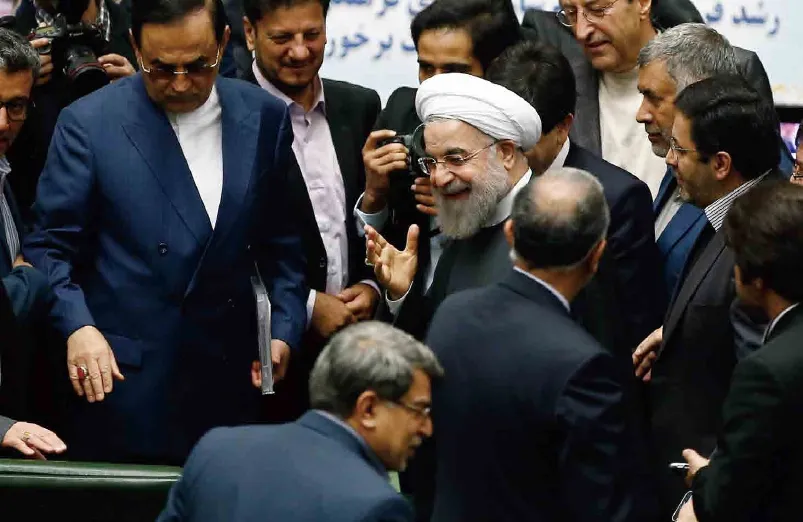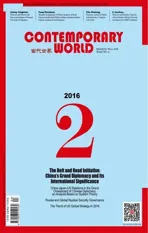Will Iran Nuclear Deal Be Effectively Implemented?
2016-11-23LIGUoFU
LI GUoFU
Director, Center for Middle East Studies,China Institute of International Studies
Will Iran Nuclear Deal Be Effectively Implemented?
LI GUoFU
Director, Center for Middle East Studies,China Institute of International Studies

After hard marathon negotiations,the Iran and the six countries concerned in the Iranian nuclear issue (US, Britain, France, Russia,China and Germany) reached a comprehensive agreement on Iran nuclear issue on July 14, 2015. Iran will restrict its nuclear plan, in exchange for which the international community will lift sanctions against Iran. The picture shows on January 17, 2016, the Iran parliament members express congratulations to Iran President lu haney (Central Right). The President indicated the relationship between Iran and the world opened a new chapter upon the implementation of the comprehensive agreement on Iran nuclear issue.
The fourth Nuclear Security Summit is convened in Washington DC of the US on March 31st, 2016. The development and utilization of nuclear energy has brought new power for the development of human society and significantly enhanced human capability of knowing and transforming the world. However, it also brought about nuclear security risks and challenge. Particularly in today's international political struggle, some states are making use of the tremendous damaging power of nuclear energy, and take the development of nuclear weapons as their last protection of safety. Therefore, it has been a major challenge faced by the international community to make peaceful use of nuclear energy for benefiting people as well as prevent nuclear proliferation,especially the acquiring of nuclear materials by terrorists or terrorist groups. In this regard, the Iran Nuclear Deal reached in 2015 has provided helpful experience for peaceful use of nuclear energy and prevention of nuclear proliferation.
With over a decade of long-lasting and arduous negotiations, the six world powers (namely the US, UK,France, Russia, China and Germany)finally reached the Joint Comprehensive Plan of Action with Iran on comprehensively solving Iran nuclear problem, which is also known as the Iran Nuclear Deal. The reaching of the Deal has effectively safeguarded the international nuclear non-proliferation institutions and lowered the risks of large-scale war in Middle East region. It has also provided helpful experience for solving major international disputes through peaceful negotiations,which has gained widespread welcome and commend from the international community.
In the principles of “a step-by-step approach, reciprocal commitments,fairness and balance”, the six world powers and Iran have reached an agreement on the process of implementing Iran Nuclear Deal, which is composed of by five flag days with milestone significance. The first one is the accomplishment day, which means the day (June 14, 2015) when the six world powers and Iran accomplished the nuclear agreement. The second one is the effective day, which is July 14, 2015, 90 days after the UN Security Council adopted the resolution. After the deal went effective, all parties should make necessary arrangement and preparation. The third day is the implementation day (January 16, 2016),when the US and EU adopt relevant actions to lift the sanctions on Iran after they verify the implementation of relevant measures by Iran. The fourth one is the transitional day, when the US and EU will further lift sanctions on Iran and Iran will seek for the ratification of the Additional Protocol after the IAEA makes an overall conclusion that all Iran's nuclear materials are still used for peaceful purpose eight years later. The fifth one is the termination day of the UN Security Council resolution, when the Iran nuclear issue has ultimately solved peacefully with the termination of Security Council Resolution 2231 (2015) stipulating other limitations to Iran if the Iran Nuclear Deal has been implemented normally for ten years.
According to the procedure and timing of implementation, this Deal has now entered its eight-year-long third stage. With the importance attached by both the US and Iran, the implementation of the Deal, though having encountered many barriers in the first two stages, has been successful in general. President Obama regards Iran Nuclear Deal as one of the few major diplomatic achievements in his tenure,so he is bound to value it particularly.
However, Iran Nuclear Deal is after all a result of compromise of interests between both sides. Neither side is quite satisfied with it. Let alone it would take as long as ten years to implement the Deal, which means that the US would experience three administrations in that period of time. Therefore, it will inevitably encounter various difficulties and challenges,and there will be many uncertainties.
Firstly, Iran Nuclear Deal will for all the time one of the focuses of struggle between the Republicans and the Democrats. The Democrats in basic support the Deal while the Republican-controlled Congress has been opposed to the US-Iran negotiations on nuclear issue from the beginning on. After failing to veto the Deal, the Republicans have tried every means to obstruct and destroy the implementation of the Deal. In the ongoing election campaign activities for the next US president, almost all Republic candidates explicitly expressed that they will not implement Iran Nuclear Deal. Among them, some very promising candidates including Ted Cruz and Marco Rubiohold an even tough stance. They threaten that they will abolish the Deal once elected. With a fast changing situation of the US general election, it is yet very hard to predict who will be the new host of the White House. However, there's one thing for certain. The implementation of Iran Nuclear Deal will suffer a serious setback if the Republicans win the election.
Secondly, although the tensions between the US and Iran have been eased with the reach of Iran Nuclear Deal, the structural contradiction and hostile strategic orientation between the two states have not changed, nor has the bilateral relationship, with a very vulnerable momentum of improvement, changed substantially. US allies in the region including Israel and Saudi Arabia have all along strongly opposed the Deal. In the increasingly fierce struggle among regional powers, any side-taking of the US may deteriorate the US-Iran relationship and add new barriers to the implementation of the Deal.
Lastly, the disputes between the US and Iran over the launching of ballistic missiles have reflected the shortcomings of the Deal. Iran insists that the Deal does not restrict Iran's rights of missile research and development. However, the US claims that Iran's launching of missiles have violated the stipulation of the Deal, and imposed new sanctions on Iran in the next day of the implementation day. At present,though the missile issue has not affected the further implementation of the Deal, it has stored potential problems for future implementation.
In short, despite the many uncertainties, the long-term implementation of Iran Nuclear Deal hinges on the development of the US-Iran relations and indeed, the sincerity and willingness of the two sides to fulfill their respective obligations.
Despite the many uncertainties, the longterm implementation of Iran Nuclear Deal hinges on the development of the US-Iran relations and indeed, the sincerity and willingness of the two sides to fulfill their respective obligations.
